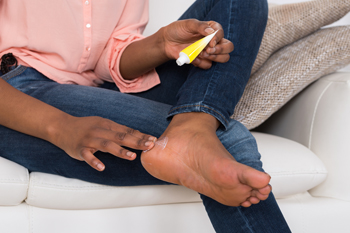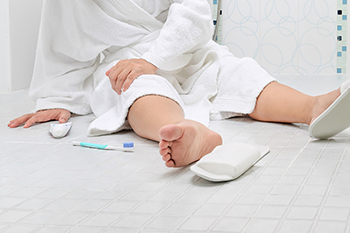Items filtered by date: January 2022
Foot Drop May Increase Your Risk of Falling
If you or someone you love is having difficulty walking up stairs, struggles with balance, or is prone to tripping or falling, they may have a condition known as foot drop. This condition makes it difficult for a person to lift the front part of the foot, and may also cause numbness, weakness, and limpness in the foot. Foot drop may also trigger a change in how a person walks, in order to counteract these impediments. Foot drop most typically occurs when the peroneal nerve (which controls the muscles that lift the foot) becomes damaged due to compression, injury, or disease. It may also be due to a muscular or anatomical issue. This condition may be temporary or permanent, with possible treatments including orthosis, orthotics, physical therapy, nerve stimulation, or even surgery if necessary. Because the symptoms of foot drop can raise a person’s risk of falling and/or tripping, a podiatrist should be consulted as soon as possible to explore all treatment options.
Preventing falls among the elderly is very important. If you are older and have fallen or fear that you are prone to falling, consult with one of our podiatrists from Barry University Foot and Ankle Institute. Our doctors will assess your condition and provide you with quality advice and care.
Every 11 seconds, an elderly American is being treated in an emergency room for a fall related injury. Falls are the leading cause of head and hip injuries for those 65 and older. Due to decreases in strength, balance, senses, and lack of awareness, elderly persons are very susceptible to falling. Thankfully, there are a number of things older persons can do to prevent falls.
How to Prevent Falls
Some effective methods that older persons can do to prevent falls include:
- Enrolling in strength and balance exercise program to increase balance and strength
- Periodically having your sight and hearing checked
- Discuss any medications you have with a doctor to see if it increases the risk of falling
- Clearing the house of falling hazards and installing devices like grab bars and railings
- Utilizing a walker or cane
- Wearing shoes that provide good support and cushioning
- Talking to family members about falling and increasing awareness
Falling can be a traumatic and embarrassing experience for elderly persons; this can make them less willing to leave the house, and less willing to talk to someone about their fears of falling. Doing such things, however, will increase the likelihood of tripping or losing one’s balance. Knowing the causes of falling and how to prevent them is the best way to mitigate the risk of serious injury.
If you have any questions, please feel free to contact our offices located in Miami, North Miami Beach, Miami Beach, and Tamarac, FL . We offer the newest diagnostic and treatment technologies for all your foot care needs.
What Causes Cracked Heels?
 Cracked heels affect up to 20 percent of adults in the United States. Although cracked heels are not usually a major issue, they can become very painful. Common factors that can cause cracked heels include standing for long periods of time, using harsh soaps, walking barefoot, dry skin, and wearing shoes that aren’t supportive. Cracked heels can also be caused by medical issues, such as vitamin deficiencies, fungal infections, obesity, or pregnancy. Common methods to prevent cracked heels include wearing shoes that do support the heel and are not too tight. Tips for relieving cracked heels are to stay hydrated, use a foot cream, and avoid standing for too long in one period. It is suggested that anyone with persistent and painful cracked heels consult with a podiatrist for a proper treatment method.
Cracked heels affect up to 20 percent of adults in the United States. Although cracked heels are not usually a major issue, they can become very painful. Common factors that can cause cracked heels include standing for long periods of time, using harsh soaps, walking barefoot, dry skin, and wearing shoes that aren’t supportive. Cracked heels can also be caused by medical issues, such as vitamin deficiencies, fungal infections, obesity, or pregnancy. Common methods to prevent cracked heels include wearing shoes that do support the heel and are not too tight. Tips for relieving cracked heels are to stay hydrated, use a foot cream, and avoid standing for too long in one period. It is suggested that anyone with persistent and painful cracked heels consult with a podiatrist for a proper treatment method.
Cracked heels are unsightly and can cause further damage to your shoes and feet. If you have any concerns, contact one of our podiatrists from Barry University Foot and Ankle Institute. Our doctors can provide the care you need to keep you pain-free and on your feet.
Cracked Heels
Cracked heels appear unappealing and can make it harder for you walk around in sandals. Aside from looking unpleasant, cracked heels can also tear stockings, socks, and wear out your shoes. There are several methods to help restore a cracked heel and prevent further damage.
How Do You Get Them?
Dry skin is the number one culprit in creating cracked heels. Many athletes, walkers, joggers, and even swimmers suffer from cracked heels. Age and skin oil production play a role to getting cracked heels as well.
Promote Healing
Over the counter medicines can help, especially for those that need instant relief or who suffer from chronic dry feet.
Wear Socks – Wearing socks with medicated creams helps lock in moisture.
Moisturizers – Applying both day and night will help alleviate dryness which causes cracking.
Pumice Stones – These exfoliate and remove dead skin, which allows for smoother moisturizer application and better absorption into the skin.
Change in Diet
Eating healthy with a well-balanced diet will give the skin a fresh and radiant look. Your body responds to the kinds of food you ingest. Omega-3 fatty acids and zinc supplements can also revitalize skin tissue.
Most importantly, seek professional help if unsure how to proceed in treating cracked heels. A podiatrist will help you with any questions or information needed.
If you have any questions, please feel free to contact our offices located in Miami, North Miami Beach, Miami Beach, and Tamarac, FL . We offer the newest diagnostic and treatment technologies for all your foot care needs.
Foot Pain and Discomfort During Pregnancy
Pregnancy can often bring on painful swelling in the feet and ankles as well as changes in your gait. The extra weight a woman gains during pregnancy puts pressure on their heels, ankles, and plantar fascia (the long tissue running along the bottom of the feet). This may cause pain in the heel and ankles, and plantar fasciitis (an inflammation of the plantar fascia). This additional weight may also alter a woman’s stride, causing her feet to flatten and roll inward when she walks. Swelling, or edema, is another common condition among pregnant women, and is caused by an excessive production of fluid, blood, and water retention during pregnancy. Also, relaxin is a hormone produced during pregnancy that can loosen and relax the ligaments in feet and ankles, possibly causing discomfort and instability. A podiatrist can help a woman throughout her pregnancy to relieve pain, swelling and discomfort, while helping to correct any gait or alignment issues.
Pregnant women with swollen feet can be treated with a variety of different methods that are readily available. For more information about other cures for swollen feet during pregnancy, consult with one of our podiatrists from Barry University Foot and Ankle Institute. Our doctors will attend to all of your foot and ankle needs.
What Foot Problems Can Arise During Pregnancy?
One problem that can occur is overpronation, which occurs when the arch of the foot flattens and tends to roll inward. This can cause pain and discomfort in your heels while you’re walking or even just standing up, trying to support your baby.
Another problem is edema, or swelling in the extremities. This often affects the feet during pregnancy but tends to occur in the later stages.
How Can I Keep My Feet Healthy During Pregnancy?
- Wearing orthotics can provide extra support for the feet and help distribute weight evenly
- Minimize the amount of time spent walking barefoot
- Wear shoes with good arch support
- Wear shoes that allow for good circulation to the feet
- Elevate feet if you experience swelling
- Massage your feet
- Get regular, light exercise, such as walking, to promote blood circulation to the feet
If you have any questions please feel free to contact our offices located in Miami, North Miami Beach, Miami Beach, and Tamarac, FL . We offer the newest diagnostic and treatment technologies for all your foot and ankle needs.
Why Do My Heels Hurt?
If you are middle-aged, overweight, pregnant, stand for long periods of time, or wear shoes that offer little cushioning, you may be a candidate for plantar fasciitis. Other causes include, having flat feet, wearing ill-fitting shoes, running or jumping on hard surfaces, and having medical conditions, such as diabetes and arthritis. The plantar fascia is a band of tissue that connects the toes with the heels. When the plantar fascia is overstretched or bruised, the heel often bears the brunt of the pain. The pain is usually worse when you first get up in the morning, or after sitting or standing for long periods of time. There are a number of home remedies, such as icing the painful area, massaging your foot by rolling a golf ball under it, losing weight, and wearing heel pads in your shoes. However, if pain continues to increase, it may be wise to seek the opinion of a podiatrist who can examine the area, properly diagnose the condition, and suggest specific treatment options.
Plantar fasciitis can be very painful and inconvenient. If you are experiencing heel pain or symptoms of plantar fasciitis, contact one of our podiatrists from Barry University Foot and Ankle Institute. Our doctors can provide the care you need to keep you pain-free and on your feet.
What Is Plantar Fasciitis?
Plantar fasciitis is the inflammation of the thick band of tissue that runs along the bottom of your foot, known as the plantar fascia, and causes mild to severe heel pain.
What Causes Plantar Fasciitis?
- Excessive running
- Non-supportive shoes
- Overpronation
- Repeated stretching and tearing of the plantar fascia
How Can It Be Treated?
- Conservative measures – anti-inflammatories, ice packs, stretching exercises, physical therapy, orthotic devices
- Shockwave therapy – sound waves are sent to the affected area to facilitate healing and are usually used for chronic cases of plantar fasciitis
- Surgery – usually only used as a last resort when all else fails. The plantar fascia can be surgically detached from the heel
While very treatable, plantar fasciitis is definitely not something that should be ignored. Especially in severe cases, speaking to your doctor right away is highly recommended to avoid complications and severe heel pain. Your podiatrist can work with you to provide the appropriate treatment options tailored to your condition.
If you have any questions please feel free to contact our offices located in Miami, North Miami Beach, Miami Beach, and Tamarac, FL . We offer the newest diagnostic and treatment technologies for all your foot and ankle needs.



